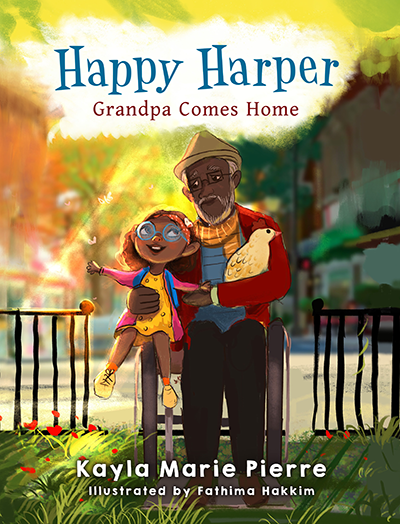 Happy Harper: Grandpa Comes Home
Happy Harper: Grandpa Comes Home
All of the judges this year loved Kayla Marie Pierre's heartwarming picture book Happy Harper: Grandpa Comes Home, the first installment in a planned series about a biracial Haitian-American girl growing up in Brooklyn. Harper loves new experiences and has a strong attachment to all the places that her family calls home. In this story, the lively little girl is anticipating the day when her beloved Grandpa in Haiti will come live with them.
There was so much to appreciate about this book, from the genuine New York feel of her illustrated neighborhood, to the storyline that was tightly structured and perfectly pitched to the concerns of this age group. My co-judge Ellen LaFleche said, "I love that Grandpa is in a wheelchair but it's not made into a big deal—so much dignity." Screener Annie Mydla observed, "The book will stir feelings of joy in readers who remember the magic of having loving grandparents, or being a loving grandparent." Stories that appeal to the adults as well as the kids in the family are a guaranteed re-read.
Readers who grew up on Mercer Mayer's Little Critter series may remember the engaging sight gags where the main character's pet frog or mouse would be doing something funny in a detail of each illustration. Searching for these surprises can give pre-literate children a way to stay involved while the adult reads aloud, adding to the book's re-read appeal. Happy Harper illustrator Fathima Hakkim does the same with Harper's pet chicken (who might be an imaginary friend, since she's wearing blue eyeglasses just like Harper's!). There's an answer key at the back of the book in case the chicken is too good at hide-and-seek for you.
Diversity statistics in children's book publishing show that we have a long way to go. According to WordsRated, a nonprofit data analytics group that studies the publishing industry, only 12.12% of children's books are about Black or African characters, and the percentage of Black characters in children's best sellers dropped 23% between 2020 and 2021.
Publishers may still be under the misconception that books must center the white experience to have "universal" appeal. Happy Harper is just one example of why they're wrong. Especially in our COVID era, when elderly relatives can't always be close to us because of infection risk, almost all children will relate to Harper's yearning for more time with her extended family. Meanwhile, Black kids will particularly appreciate this positive portrayal of a community that looks like theirs.
The book design was bold and cheerful, with appropriately large print. Important words on each page were emphasized with a bigger typeface in different colors, which was cute but sometimes didn't have enough contrast with the background. The book cover and end notes were missing an author bio. Including this information would make the book seem more professional, as well as demonstrating that this is an "own voices" work. We look forward to more of Happy Harper's adventures!









